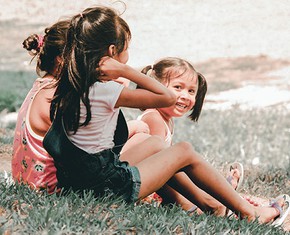The views expressed in our content reflect individual perspectives and do not represent the authoritative views of the Baha'i Faith.
At 5:00 pm, the time when the stress of the day has taken its toll and my energy ebbs, I remember – tonight is the Women’s Interfaith Devotional at my girlfriend’s house!
My beautiful Persian friend Naghmeh has tried to get me to attend the devotional for months, but because of moments of exhaustion like this I hadn’t yet. Today, though, I feel like I owe it to myself to do something really fun and spiritually nourishing, and to shake off any feelings of loneliness that can sometimes creep up when I’m not paying attention.
Baha’i devotional meetings occur naturally in communities where conversations about spiritual connection take place. In diverse settings, Baha’is and their friends and families unite with one another in loving discussion and prayer. Simple Baha’i devotionals have no rites, rituals, or formality, and no one individual has any distinct role. These humble gatherings generate a spirit of unity and communal worship, and this spirit begins to infuse the community with harmony and union, permeating collective endeavors with empowerment.
So I took a brief rest, grabbed something to eat and off I went. As I entered my friend’s house, a beautiful group of women from many cultures, backgrounds and religions stood to greet me – all coming together for the purpose of fostering a loving community with the emphasis on unity. Naghmeh welcomed us all and we briefly said a few words about ourselves.
“This is your Devotional everyone. What would you like to pray about or discuss?” our host asked us.
As it happened, several women there had recently lost loved ones. Naghmeh and I shared that one of our dear friends had passed away just days before, so we began the meeting with a poetic Baha’i prayer for the departed, specifically for women:
Bestow upon Thy heavenly handmaiden, O God, the holy fragrances born of the spirit of Thy forgiveness. Cause her to dwell in a blissful abode, heal her griefs with the balm of Thy reunion, and, in accordance with Thy will, grant her admission to Thy holy Paradise. Let the angels of Thy loving-kindness descend successively upon her, and shelter her beneath Thy blessed Tree. Thou art, verily, the Ever-Forgiving, the Most Generous, the All-Bountiful. – Abdu’l-Baha, Baha’i Prayers, pp. 44-45.
After the prayer we began talking about the afterlife and our religion or culture’s view on the subject. One of the Christian women asked a Sikh woman how her religion viewed heaven and hell. She said that they believed heaven was nearness to God and hell was remoteness. The group overwhelmingly concurred that basically this is what their religion taught, and this set the tone for a harmonious evening to come. We read prayers from different religions, and with each of them we found common ground.
Furthering this atmosphere of unity, Naghmeh read from a compilation of writings regarding the “Golden Rule,” found in all religions. As she read, one could scarcely decipher which religion she was quoting, they all seemed so similar:
So in everything do to others what you would have them do to you. – Matthew 7:12.
Do not to others what ye do not wish done to yourself; and wish for others too what ye desire and long for, for yourself. – The Mahabharata 5:1517.
None of you truly believes until he wishes for his brother what he wishes for himself. – Bukhari, Volume 1, Book 2, #15.
Love thy neighbor as thyself. – Leviticus 19:18.
Make thine own self the measure of others, and so abstain from causing hurt to them. – The Dhammapada.
Choose thou for thy neighbor that which thou choosest for thyself. – Baha’u’llah, Epistle to the Son of the Wolf, p. 30.
I commented that for thousands of years many of the world’s religions have fought each other – when in fact their essential spiritual teachings are basically all the same, and that our commonalities far exceed our differences. Everyone concurred. As we continued to talk about unity I felt a deep sense of belonging and connection to this group of women, many of whom I had never met before. We had all come with open hearts and loving intentions and a spirit of compassion felt palpable in the room. As the evening continued there was much joy, laughter, and sharing on a deep personal level, all in a safe, empathetic environment.
I looked down at my phone and couldn’t believe an hour and a half had whizzed by. “I’m so sorry but I have to get going,” I said as I got up. Several other women had to leave as well so we said our goodbyes with hugs and offers of prayers for each other until our next meeting.
As I drove home the sun went down, with pink clouds against a turquoise sky, and I felt a joyful and supportive connection to my little community of women – an auspicious beginning to an ever broader connection to the wider community of the world.
We know, scientifically, that connection to others and to our community improves our outlook, mood, and health. Feeling supported by others is essential for our well-being. As the article says, “Studies have shown that feelings of belonging and trust in others were the strongest predictor of mental well-being and controlling physical health problems.”
Today Baha’is and their friends from all Faiths and no particular faith hold thousands upon thousands of these types of devotional meetings in localities throughout the world – in large cities, small neighborhoods and remote villages. Whether for women, for children and youth, or for anyone who wants to join together in the spirit of supplication to the Creator, you’re welcome to attend and participate. If you’d like, you can contact the Baha’is in your neighborhood, or start a devotional of your own. Your spirit, your community, and the world will thank you for it:
Gather ye together with the utmost joy and fellowship and recite the verses revealed by the merciful Lord. By so doing the doors to true knowledge will be opened to your inner beings, and ye will then feel your souls endowed with steadfastness and your hearts filled with radiant joy. – Baha’u’llah, from a tablet to an individual Baha’i.
















Comments
Sign in or create an account
Continue with Googleor